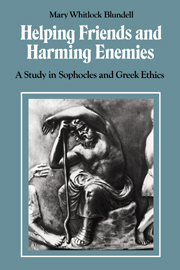1 - Introduction
Published online by Cambridge University Press: 14 January 2010
Summary
Let us add to the philosophers a most learned man, and indeed a divine poet: Sophocles.
Cicero, De DivinationeTragedy and ethics
According to Aristotle, character or ethos in tragedy is ‘that which reveals what the moral choice is like’ (Po. 50b8f.). Although I did not come to this study by way of Aristotle, this kind of ethos is what I wish to explore in Sophocles, by examining five tragedies in which moral choice is central to the course of the drama. These choices are made within the context of traditional Greek morality, which, amongst other things, expected one to help one's friends and harm one's enemies (abbreviated hereafter as ‘Help Friends/Harm Enemies’ or ‘Help Friends’ and ‘Harm Enemies’). Closely allied to these principles, as we shall see, is the conception of justice as retaliation. I have chosen to focus my discussion around this nexus of principles, since they provide a pervasive ethical background to most of Greek literature and are of special significance for tragedy. They are also connected with broader ethical questions, such as the nature of pleasure and advantage. In particular, both Help Friends/Harm Enemies and retaliatory justice are rooted in passion, and therefore raise profound questions about the rationality of moral action and the relationship of moral justification to the emotions. In the next chapter I shall outline the salient features of Help Friends/Harm Enemies, in order to illustrate its scope as a moral code and provide a context in which to assess Sophocles' handling of such issues.
- Type
- Chapter
- Information
- Helping Friends and Harming EnemiesA Study in Sophocles and Greek Ethics, pp. 1 - 25Publisher: Cambridge University PressPrint publication year: 1989



